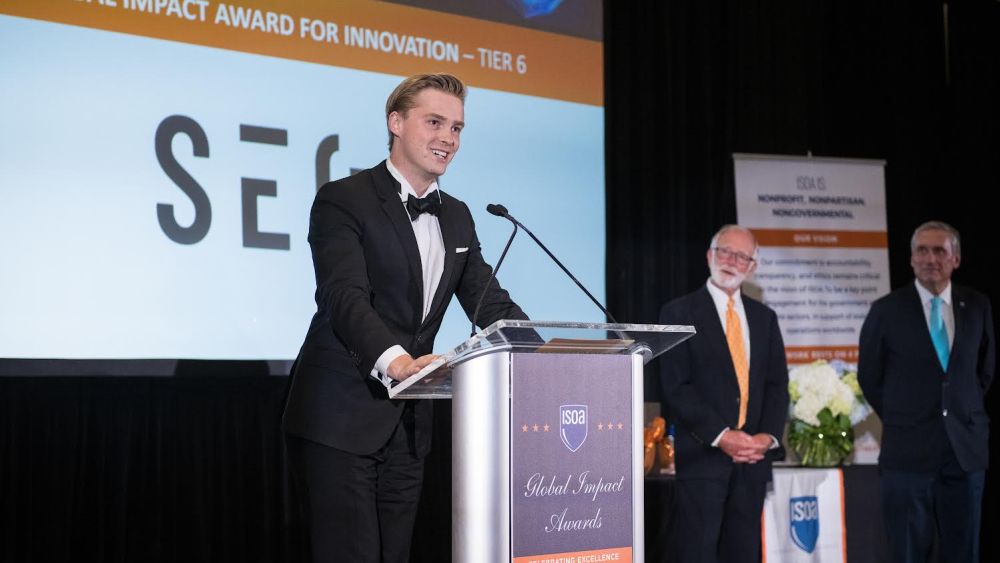Meet SEON: a South African Securetech Startup with Global Ambitions
Table of contents
The Org sat with SEON's co-founder to learn how it raised $5 million and built software that helps African security companies respond to emergencies more quickly — and even save lives.

From the moment he finished high school, SEON Group co-founder and CEO Finn Plotz knew college wasn’t in his cards — but entrepreneurship was. The calculated risks he took to launch his securetech startup five years ago are finally paying off. The Org sat with Plotz learn how SEON raised $5 million and built software that helps African security companies respond to emergencies more quickly — and even save lives.
Failing fast and failing forward often pays off
Plotz was born and raised in a small village outside of Hamburg, Germany, but he spent one of his high school years as an exchange student in Cape Town. He left the program intent on establishing a business with ties to Africa, and a year later, at age 18, he founded his first startup.
Dubbed “VION,” the company manufactured all-in-one smart remotes that could do the job of a handful of individual household remotes. Plotz was building the business at a time when smart televisions from tech giants like Amazon and Apple were gaining traction, which led him to rethink the business model and subsequently close the company down. He took some time to reflect on the lessons learned from VION and plan his next venture.
About SEON
Founded in 2017, SEON is a software company that provides end-to-end technology that can help emergency response service businesses respond more quickly, ultimately saving lives.
“When you read about health emergencies and crime incidents the common thread is that lives could be saved if help came much quicker,” Plotz told The Org.
With a strong understanding of the South African market and the high crime rates in the country, Plotz moved from Germany to Cape Town to set up SEON with $350,000 in seed capital from investors in his previous business.
Pivoting a business model for scale and market traction
The first version of SEON’s product was a wearable device for which individuals paid a monthly subscription. The device included GPS-enabled technology that could quickly alert police or private security companies if the wearer was involved in a dangerous incident.
But the company soon learned that neither police nor emergency response companies had the capacity to receive digital alerts from human-held devices — for example, if someone pressed the device’s button while being locked up in the boot of a moving vehicle. SEON soon pivoted to build a scalable B2B offering that could enhance existing emergency response systems.
“We figured out that pivoting from providing IoT consumer tech to an enterprise SaaS platform was the right call,” Plotz said. “Had we not done that, I don’t think the company would still be here.”
Building the business in an emerging market and raising capital in Europe
SEON’s primary software-building hub sits in Hamburg and is managed by Plotz's co-founder and CTO Nils Lowe. Cape Town serves as the company’s African headquarters. This was a deliberate move to capitalize on the fact that South Africa’s emergency services industry is privatized to a greater degree than that of Germany.
“If you look at our overall market size in emergency services, Africa is the third largest market after South America, and the U.S. is the largest," Plotz explained. South Africa’s strong pool of private security providers, great infrastructure, skilled talent and a solid legal framework to operate a business within makes it a conducive environment for SEON, he added.
Back in Hamburg, SEON is harnessing the reputation and power of German engineering to build high-quality technology. It has also tapped into funding opportunities, pocketing $5 million to date in seed capital from German and European Union governments and European VCs like Parsec Capital.
SEON is active in five markets — South Africa, Zambia, Zimbabwe, Kenya and Uganda — and its user base has consistently grown 30% on a month-to-month basis with recurring revenue coming in.
Plotz admitted the path to getting market traction and revenue took time. SEON did not earn revenue for three years, while the company focused on getting the product right. SEON has also learned key lessons for scaling into new markets. For example: you don’t need on-site infrastructure, and clients can be on-boarded digitally, reducing operations costs.
Becoming a globally recognized company in security innovation
In June, SEON received the Global Impact Award for Innovation 2022 from the security industry body International Stability Operations Association (ISOA) in Washington D.C. for developing new or more technologically advanced approaches to challenges in the stability industry and improving the efficiency and overall program performance of security companies.
“It’s brilliant to receive recognition from the industry that we are heading in the right direction,” Plotz said. “We know our software is making a difference at ground level in terms of emergency response times, our hope is that our technology will now save lives in countries all over the world, as the market adopts,new faster way of handling emergencies.”
With five years experience and a track record in the African market, SEON is setting its sights on the U.S. and is currently pinpointing a suitable entry market and building a rollout plan. The breadth of the U.S. market could allow SEON to generate the same a year’s worth of Africa revenue in just one month, Plotz said, but the company remains bullish on growing and strengthening its value proposition in Africa at the same time.
Sign up now:
In this article


The ÂÜŔňÂŇÂ× helps
you hire great
candidates
Free to use – try today
